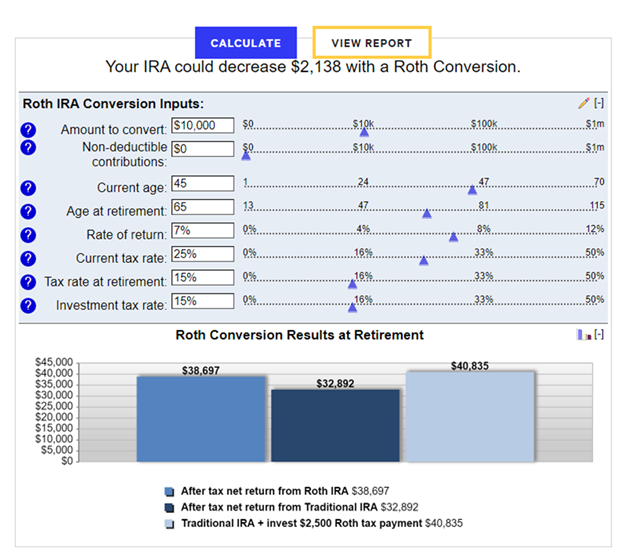A Roth conversion is simply the process of taking a pre-tax IRA (that grows tax-deferred until withdrawn) and converting it into a Roth IRA, paying the taxes now, and allowing it to grow tax-free until withdrawn. Roth conversions are generally good for people that pay at lower tax rates today than they anticipate paying in the future.
While it is usually framed as a decision based on the tax impacts, the real test of this strategy is whether conversion makes realization of your goals and objectives more or less likely in the future. There are also many non-tax considerations to this decision including health insurance and estate planning.
Some online calculators will attempt to quantify the impact for you; but more often, it’s necessary to have a deeper discussion about whether the strategy makes sense for you.
For example, this calculator on Bankrate.com says you can decide based on eight numerical inputs to their calculator.

Source: Bankrate.com. Modera is not affiliated in any way with Bankrate.com or any of its related entities. While such third parties are deemed to be reliable, Modera makes no representations as to the accuracy of any information presented by a third party.
While these inputs are a big part of the equation, financial planning involves both the art and science of these decisions.
Here are the inputs and some of the things you should consider in the process. As you can see, many of the inputs are not binary but rather a range of potential values.
Amount to Convert – this is the amount of IRA balance that you intend to convert. While this is the first input in this calculator, it would probably be the last number I put into our planning software as it depends on all the other inputs and a number of other considerations, i.e. one-time conversion, multi-year conversion, etc.
Non-deductible Contributions – this is the amount of after-tax money that was placed in the IRA account in the past. Since tax has already been paid, incremental tax on this amount is not due upon conversion. This amount can be quantified by reviewing previous tax returns, so if you have good records, it is easy to get correct. I would also want to know if you have any after-tax money in other retirement accounts, like Roth 401Ks, etc. to determine if other opportunities might be more productive than a Roth conversion.
Current Age – the easiest and least subjective question to answer.
Age at Retirement – this is an educated guess based on your current plans. In our experience, this calculator places too much emphasis on this one point in time. The more correct question to ask is when will you need these funds? The conversion recommendation should be different if these funds form the foundation of your retirement spending beginning at age 65, or if they are funds you may not need until later in retirement, if at all.
Rate of Return – the anticipated rate of return that is anticipated on the portfolio of investments.
Current Tax Rate – ordinary income tax rate from most recent tax return and current year’s tax projection.
Tax Rate in Retirement – the tax bracket(s) you anticipate being in at different stages of retirement and the associated rates for those brackets. Brackets can shift during retirement when wage income declines and again when Social Security income and mandatory retirement distributions are added. Congress can also change the tax rate that applies to each bracket.
Investment Tax Rate – similar to tax brackets above, the anticipated tax on investment income and gains is dependent on the amounts and Congressional actions.
Other considerations this calculator ignores:
Health Insurance Premiums – private health insurance premiums (pre-Medicare) and Medicare premiums may be income-dependent, and the economics of a Roth conversion can be significantly impacted by loss of a subsidy or imposition of a surcharge on your healthcare spending.
Estate Planning – the tax implications of inheriting a Roth or traditional retirement account can be material to your beneficiaries. If maximizing family wealth is critical to you, we need to know if the Roth conversion enhances or diminishes family wealth.
While these calculators and simulations make it seem like a binary, numbers-driven decision, the reality is that many of the inputs are subject to change and may be out of your control. They may be a good start, but are typically not enough to get your question answered.
In addition to closely analyzing the inputs above, we take into account the following:
Diversification: Much like the diversification that we seek in our investment approach, we look to create tax diversification for clients. The assets in an ideal client portfolio will be diversified in taxable investment accounts (typical brokerage account), tax deferred accounts (Traditional IRA/401K) and tax-free accounts (Roth IRA/401K). This structure allows you to draw from different buckets as needed and maintain some control over the timing of taxable gains/income recognition.
This is especially true in today’s precarious tax environment. Placing all of one’s assets in one of these buckets may seem ideal now, but Congress can and does change the rules along the way with some frequency, so having multiple options provides you with additional control.
Other Planning Areas that Could be Impacted: Second, we consider the big-picture and address other areas that are lacking from the simple online calculators, such as the health insurance and estate planning issues mentioned above.
The question “To Roth or Not to Roth” is one that is best answered with in-depth analysis, and not simply with a few simple inputs. If you would be interested in learning more about our thought process on the financial decisions you face, please reach out to us.
